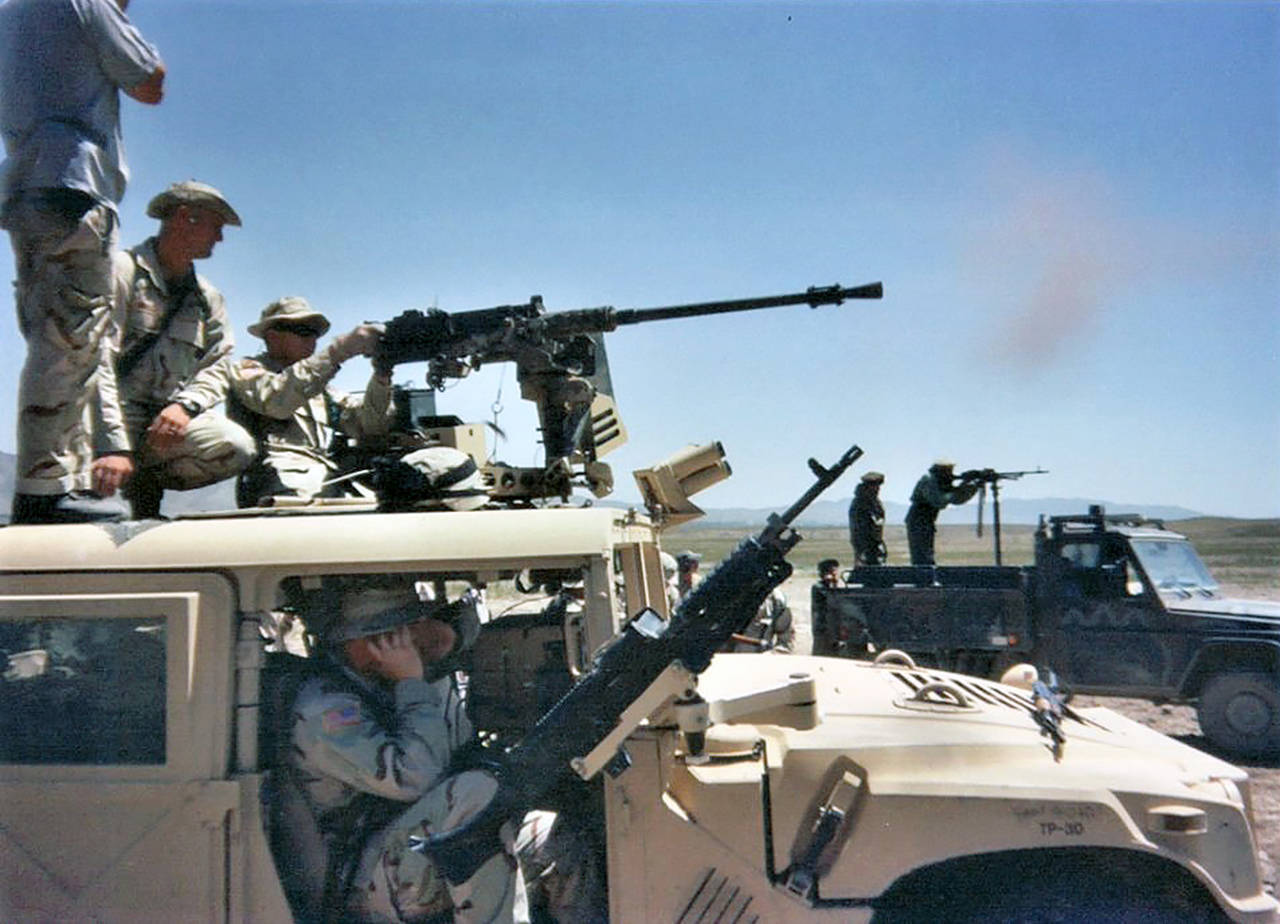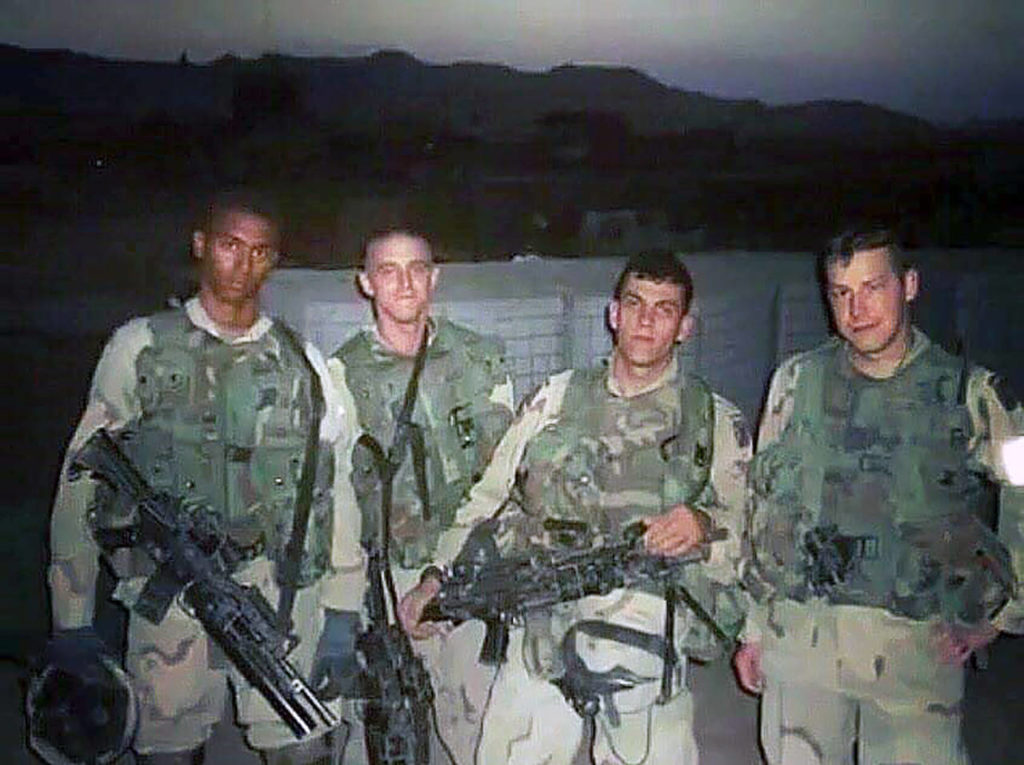Drew James was watching ESPN’s “SportsCenter” that shocking Tuesday morning. He was a 21-year-old soldier based at Fort Drum in northern New York. He switched channels in time to see the second plane crash into the World Trade Center. Black smoke rose from the North Tower that had already been hit.
Now 41, he said he knew right then, “OK, I’m going somewhere.”
James, who lives near Snohomish in the Machias area, soon learned at a briefing that Afghanistan would be that place. It was the first time he’d heard of Osama Bin Laden, architect of the Sept. 11, 2001, attacks.
“We couldn’t even tell our families we were going,” James said. He was single at the time. Today, he’s a father of three who’s been married 15 years, and a past commander of VFW Post 7511 in Monroe.
The Biden administration announced April 13 that all U.S. troops — currently at least 2,500 — would be withdrawn from Afghanistan by Sept. 11, the 20th anniversary of the 9/11 attacks. Over two decades, more than 2,200 Americans were killed there and some 20,000 wounded.
“My feelings are mixed,” said James, who has a bracelet dedicated to Evan W. O’Neill, a young private who died in Afghanistan.
In some ways “I feel like we’re giving up” by withdrawing troops, he said. Yet he believes a war on “terrorism in general” is “a war you can’t win. It’s not like fighting the Germans or Japanese in World War II.”
“It’s a yes but no,” he said. “We’ll pull out the military side but still have the diplomatic side to help.”
Serving in the Army’s 10th Mountain Division, 1st Battalion, 87th Infantry, James was among the first 10,000 U.S. combat troops in Afghanistan.
By October 2001, he was in Uzbekistan. A few months later, at Bagram Airfield in Afghanistan, his unit provided security for missions being flown by coalition forces.
Much tougher times would come in March 2002. That’s when James endured “a long, long, painful 10 days” as part of Operation Anaconda, a large-scale combat operation. With U.S. and coalition forces and their Afghan allies, its aim was to root out al-Qaeda fighters and their Taliban backers in the Shah-i-Khot Valley.
Along with al-Qaeda and Taliban members, there were “multinational terror groups,” Chechens and others, James said. In a rugged battle covering many miles, U.S. troops and allies traded mortar fire with the enemy and were targeted with machine guns and rocket-propelled grenades.
“It was pretty hot that first night,” said James, who described having to dig fighting positions into the ground. Many al-Qaeda and Taliban holed up in a town. The U.S. took aim with mortars and airstrikes. Hundreds of enemy fighters were killed, and James said many surrendered and were eventually sent to Guantanamo Bay.
James returned to Afghanistan on a second deployment in 2003. He was at remote Firebase Shkin, near the Pakistan border. “It was very hostile. Rocket attacks came every day at 2 p.m. They had a distinct whistle,” said James, who was involved there in training the Afghan National Army.
It was near Shkin, on Sept. 29, 2003, that Evan O’Neill was killed by a sniper, James said.
“Evan’s dad was a Vietnam War veteran. He wanted to follow in his dad’s footsteps,” said James, describing the 19-year-old as “a straight-away kid who always did what he was told.”
For the past few years, James has visited O’Neill’s parents in Haverhill, Massachusetts. “I had some things to get off my chest. They were gracious,” he said.
James now works for Boeing as a methods process analyst. He returned from Afghanistan with so many memories — the sounds and sights of war, people he encountered, conditions he survived.
In Uzbekistan, he stayed a month in an old ammunition bunker that later, he said, was found to be contaminated with toxic chemicals, including mustard gas. During Operation Anaconda, a resupply of food was once dropped way out of range. “We were left to just one MRE (meals ready to eat) between four people for about a week,” he recalled. “I had a pack of crackers to last me a few days.”
The desert temperature was typically 115 degrees, but in the winter cold it was enough to snow.
“All combat vets, we’ve lived through hell,” said James, the grandson of two World War II veterans. “I now focus on other guys, that’s what I do.”
His priorities are family and those he can help through the Veterans of Foreign Wars. He’s seeking a statewide leadership post with the organization and has worked to make VFW gatherings more family-friendly.
He reflects on how the mission in Afghanistan changed.
In the early days of the war, “we were supposed to get the terrorists,” he said. Just months after 9/11, bin Laden had been the target of a December 2001 battle at Tora Bora, a cave complex in eastern Afghanistan, but “slipped out,” James said.
Bin Laden’s death, in a U.S. Special Forces raid on his compound in Pakistan, would come May 2, 2011. James, who left the military in 2008, had just returned to his then-home in California from a fishing tournament when he heard the news. “I was ecstatic,” he said. “We got the bad guy.”
By then, the mission had evolved into the global war on terror, and peacekeeping in Afghanistan, James said.
Yes, he knows the gains that could be at risk with the U.S. withdrawal. What will happen to women’s rights in Afghanistan, or the Afghan government’s moves toward a democratic system?
“It’s not up to us anymore,” James said. “We should have handed this off quite a while ago.”
Julie Muhlstein: jmuhlstein@heraldnet.com
Talk to us
> Give us your news tips.
> Send us a letter to the editor.
> More Herald contact information.


























